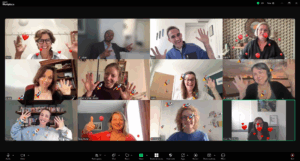Artificial Intelligence (AI) is no longer a distant future—it’s the present, actively shaping workplaces across the UK. From automation to decision-making support, AI is transforming the way businesses operate. But as technology accelerates, one question remains: how do we ensure AI enhances human potential rather than replacing it?
In the UK, AI adoption has surged by 66% since 2023, with 44% of office workers excited about integrating AI into their workflows. However, a significant 37% of employees remain uncomfortable with AI, highlighting a growing divide in the workplace. This shift presents both opportunities and challenges for businesses, leaders, and coaches.
The key to navigating this transformation? Embracing a relational, systemic approach to AI integration.
Many organisations take a transactional approach, treating AI as just another tool. But in reality, AI is now a systemic force—an extension of the team that influences decision-making, collaboration, and leadership dynamics.
This is where Organisation and Relationship Systems Coaching (ORSC™) comes in. ORSC methodology, particularly Alignment Coaching, provides a framework for leaders and coaches to help teams build a relationship with AI rather than fear it. AI isn’t just a tool—it’s part of the system, and how we integrate it matters.
In this blog, we’ll explore:
- The impact of AI on UK workplaces
- Why relational leadership is the key to AI adoption
- How Alignment Coaching can help teams navigate AI integration with confidence
The AI Era – How Work is Changing in the UK
AI’s Growing Role in the Workplace
AI is reshaping industries at a rapid pace. In the UK alone:
- 66% of businesses have increased AI adoption since 2023.
- 44% of UK employees are optimistic about AI’s role in their work.
- However, 37% of employees feel uncomfortable or resistant to AI-driven changes.
- AI could displace up to 275,000 private-sector jobs annually—but it is also creating new opportunities in emerging fields.
While AI promises efficiency, cost savings, and innovation, the human response to AI varies. Many employees feel excitement, while others experience fear, job insecurity, or resistance.
AI isn’t just about technology—it’s about people, relationships, and systemic change. And that’s why coaching and leadership matter more than ever.
The Human-AI Divide: Why Coaching Matters
One of the biggest challenges in AI adoption is the emotional and relational impact on teams. Employees often struggle with:
- Fear of job displacement
- Lack of trust in AI-driven decisions
- Uncertainty about how AI fits into their roles
Without proper leadership and coaching, AI adoption risks creating a divided workforce—where some embrace the change and others resist it.
Coaches and leaders must bridge the gap, helping teams align around a shared vision for AI integration. The goal isn’t just to implement AI but to build a relationship with it—as a collaborative, supportive force rather than a threat.
Why Relational Leadership is the Key to AI Integration
Transactional vs. Relational Leadership
Most companies take a transactional approach to AI:
- “AI will improve efficiency. Let’s implement it.”
- “AI is a tool—just use it.”
- “AI replaces human effort, reducing costs.”
But AI isn’t just a tool—it’s a systemic shift that influences how teams function. AI is now a part of the workplace ecosystem, affecting relationships, workflows, and decision-making.
This is why leaders must adopt a relational leadership approach, where AI is integrated thoughtfully and systemically. AI should be positioned as a collaborative partner, not a competitor.
The ORSC Perspective: AI as a Relationship System
In Organisation and Relationship Systems Coaching (ORSC™), teams and organisations are seen as living relationship systems. AI is now a part of that system—meaning leaders must coach AI integration, not just implement it.
Instead of seeing AI as a replacement for human work, leaders should position it as a team member—enhancing human potential, rather than replacing it.
Key question for leaders & coaches: How can teams form a productive, trusting relationship with AI as a “systemic partner”?
How Alignment Coaching Helps Teams Embrace AI
What is Alignment Coaching?
Alignment Coaching is an ORSC tool that helps teams and leaders navigate differences and find common ground. AI adoption often creates conflicting viewpoints—some see AI as an opportunity, while others see it as a threat.
Alignment Coaching helps teams co-create a shared vision for AI, ensuring that resistance doesn’t derail progress.
Key Principles of Alignment Coaching for AI Integration:
1. Bi-Lateral Ventilation: Addressing Fears & Excitement Around AI
- Give employees a safe space to voice their concerns and excitement.
- Structure conversations so individuals speak to a coach or leader rather than debating each other.
- Example: A team may say, “I’m worried AI will replace me” or “I’m excited about AI but don’t know how to use it.”
2. Finding the Common Interest Behind Different AI Positions
- Employees may fear AI, while executives see it as a cost-saving tool.
- The common interest: Everyone wants a workplace where people remain valuable and AI supports success.
- Reflect these shared values back to the team to help them align.
3. Putting the Problem Out in Front
- Many teams struggle with AI because they see it as an opposing force.
- Use Alignment Coaching to externalise AI as an issue to solve together, rather than something dividing the team.
- Example: Position AI as a “neutral entity” and shift the conversation from “AI vs. humans” to “how do we work with AI?”
4. Seeking Higher Ground: AI as a Tool for Systemic Change
- Reframe AI from a job threat to an opportunity for professional evolution.
- AI can reduce repetitive work, allowing humans to focus on creativity, strategy, and relationships.
- Align teams around the bigger picture: Preparing for the future of work together.
The Future of Coaching in the AI Era
AI is here to stay—but how we integrate it will determine the future of work.
As leaders and coaches, the challenge isn’t just adopting AI—it’s coaching teams through AI adoption. This requires Alignment Coaching, systemic thinking, and relational leadership.
AI shouldn’t be seen as a threat but as a collaborative partner that enhances human potential. The more provocative and visionary leaders are in their approach to AI, the more they will shape the future of work at all levels—individuals, organizations, and society.
Are you ready to help your teams align around AI and the future of work? Join us either virtually or In-Person in May to start your ORSC journey. You could complete the entire ORSC training as early as July!






